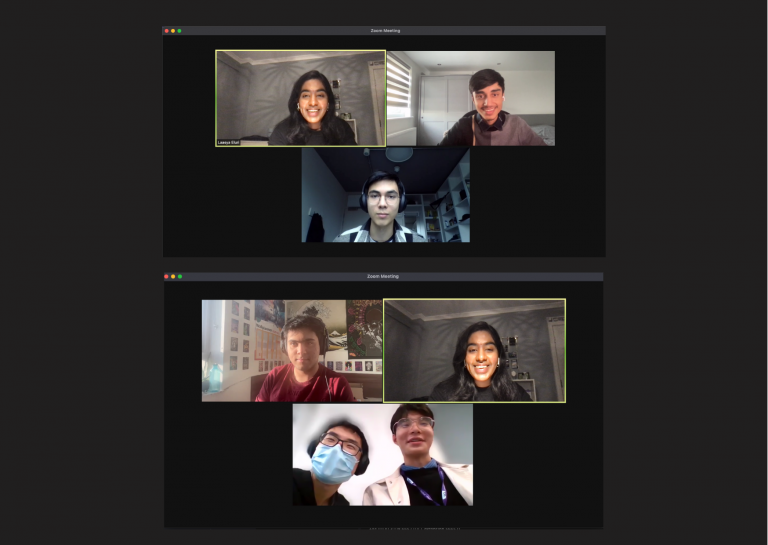Programming Tutor Scheme: Peer to peer support for new undergraduate students
22 March 2022
The Programming Tutor Scheme is a drop-in style, student-led activity that allows undergraduate students in senior years to support first-year students with any queries and concerns related to programming, as well as providing peer support service.

Kelly Ding is an undergraduate student at UCL Computer Science, and one of our current senior programming tutors. She explains how the scheme works:
"The Programming Tutor Scheme has been running for a number of years. I applied for the role because I had a really great programming tutor in my first year when I was really struggling with my studies. I would like to be a good programming tutor like her. In my experience, these sessions are very welcome by the tutees and the tutors enjoy supporting their peers. People find it useful in general."
How are Student Programming Tutors selected?
Over the summer months, Year 2, 3 and 4 Undergraduate students are invited to apply to become a Programming Tutor or Senior Programming Tutor via a formal application process, overseen by UCL Staff. Students who have applied to be Senior Programming Tutors are shortlisted and interviewed by key departmental staff (i.e. the Undergraduate Programme Director and Undergraduate Administration team), and once recruited, they then go on to shortlist, interview and recruit their peers from the Programming Tutor applicant pool.
Tutors are not only chosen for their excellent academic performance, they also need to possess the ability to explain technical terms, and be considerate of how first-year students might feel when they first come into the university. They are asked questions such as "what will you do if your tutee is struggling and wants to drop out”, “what would you do if you cannot answer their questions”? Through this, we can establish whether they have thought about this before and get an indication of their abilities in teaching and mentoring.
Introductory sessions are held with the programming tutors during the first week of term, where we answer any questions or concerns.
How do new students to UCL Computer Science find out about the scheme?
The scheme is presented to new first-years during Fresher’s Week, along with recommendations for additional resources and activities they could participate in at UCL CS.
Programming Tutors hold an introductory session at the end of Fresher’s Week to help first-year students set up the programming environment on their personal laptops. We have a robust set of instructions and “set up your environment” protocol, which have been user-tested and refined over the years
First-year students are then allocated into groups and assigned tutors.
Tutors continue to receive ongoing support from the senior tutor team throughout the academic year. Feedback on the sessions is collected and presented to the department at regular intervals.
How do the sessions work?
The programming tutors offer support sessions 2-3 hours every week. Attendance is optional. Tutors arrange a mutually convenient time with their tutees.
Pre-covid, they would meet on campus (mainly at the refractory, engineering hub, computer lab, otherwise, any bookable space). From 2020, the sessions were fully online. However, as we have returned to campus, students can opt to meet in person or online.
Eluri Laasya is an undergraduate student and one of a number of ‘Programming Mentors’ at UCL Computer Science. Here she talks about the scheme and how it benefits fellow students:
"When you are studying a subject like computer science, there’s a lot to learn. Different programming languages and styles, effective communication, multidisciplinary thinking and most importantly, problem solving. While it is a lot of fun, the sheer vastness and rapidly changing aspect of the subject will leave you with gaps in your knowledge that continually need to be filled (hence, we are all here to learn!).
The programming tutor scheme makes the perfect use of peer collaboration and learning from each other through weekly two-hour workshops. During these sessions, we start by covering highlights of the course that week, some aspects that could have been smoother, and how everyone if feeling at that point in term.
Moving on from reflections, the rest of the session is usually spent devoted to prepping for a test (solving previous years’ papers, teaching concepts etc.), debriefing how to approach a coursework, how to write and format a CV or even general talk on societies, research and future fields of interest. The meetings are a one stop destination for the group of tutees to reflect, ask for advice, set new goals and take on new projects.
Throughout my first year, I found it extremely helpful to speak to someone who had gone through the exact same modules / classes as me for their advice and resources. Their first-hand experience on the matter was incredibly insightful. On the other side of things, this year as a tutor, I find it enriching to share my knowledge and learn new things ways of doing or thinking about things from my tutees and preparation sessions. Overall, being both a tutee and a tutor has enriched my UCL CS journey."
UCL Computer Science would like to say thank you to Kelly, Eluri and all the programming tutors for their support!"
 Close
Close

